***
If you like this blog you can have links to each week's posts delivered to your e-mail address. Please click here.
|
As if ballet were not difficult enough, this Chinese circus troupe puts on an amazing performance of the classic Tchaikovsky masterpiece! *** If you like this blog you can have links to each week's posts delivered to your e-mail address. Please click here.
6 Comments
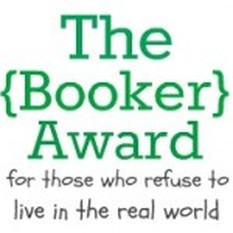 It is an honor to have been nominated for the Booker Award by Kindle Book Reviewer Marilou George. Please visit her website “Confessions of a Reader” for some thoughtful reviews of books that are both great and fun. I am now supposed to list my top five favorite books and pass the award on to five other bloggers who share the passion for reading books. However, instead of just merely listing single books I will list books or collections of stories that form part of a world-building series. 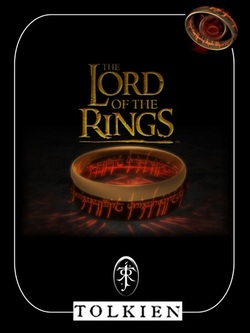 Quote: One Ring to rule them all, One Ring to find them, one Ring to bring them all and in the darkness bind them. J. R. R. Tolkien created the fantastic world of Middle Earth with its many complex languages and creatures delighting us with the quests of Bilbo Baggins in “The Hobbit” and Frodo Baggins in “The Lord of The Rings.” The triumph of Frodo and his comrades over the evil Sauron and his minions is an uplifting tale full of stories within stories and legends within legends weaved together into a masterpiece of storytelling brilliance. 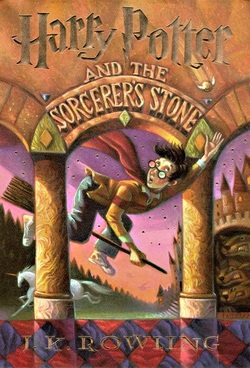 Quote: Mr. and Mrs. Dursley, of number four, Privet Drive, were proud to say that they were perfectly normal, thank you very much. So beings “Harry Potter and the Sorcerer’s Stone” the first volume of the epic journey of a boy wizard inhabiting a world right next to ours but carefully hidden from our view. The fantasy J. K. Roling created became a phenomenon that touched the lives of millions of children as well as adults. The adventures of Harry, Ron, and Hermione in their fight against the evil Voldemort and his Death Eaters will endure for ages. 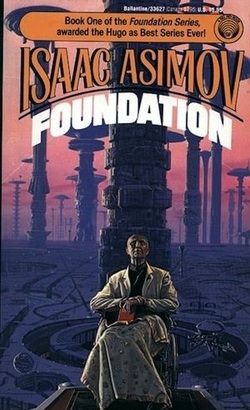 Quote: 1) A robot may not injure a human being or, through inaction, allow a human being to come to harm. 2) A robot must obey the orders given to it by human beings, except where such orders would conflict with the First Law. 3) A robot must protect its own existence as long as such protection does not conflict with the First or Second Laws. These are the three laws of robotics created by Isaac Asimov as the cornerstone of his Robot Novels which were complemented by his Foundation novels where he lays out his vision of the future of humanity guided by the science of psychohistory. This is one of my favorite authors because both in his novels and his life Asimov believed in the eventual triumph of science and rationality over folly. 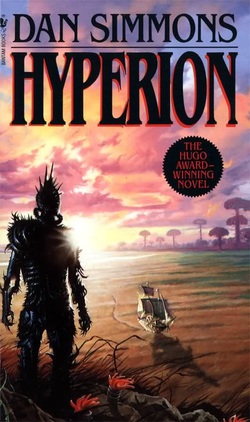 Quote: And what rough beast, its hour come round at last, slouches towards Bethlehem to be born? Dan Simmons with the Hyperion series of books (the Hyperion Cantos) created not a world but dozens of them to which humanity has expanded only to face some formidable enemies attacking from within. The vastness of his vision that spans both time and space blending science, religion, and the work of poets like Yeats is truly formidable. 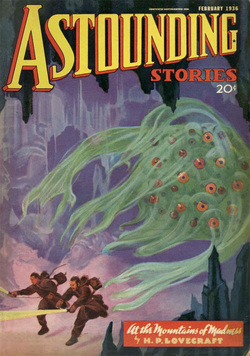 Quote: That is not dead which can eternal lie, and with strange aeons even death may die. And we end with the master of horror, H. P. Lovecraft, who in his stories imagined humanity as an insignificant latecomer to a world once ruled by Gods and other formidable creatures that are still worshipped by obscure cults in bizarre rituals. His vision of the sheer terror that arises when people come in contact with the remnants of this world has inspired many other writers from Robert Bloch to Stephen King. And I nominate the following bloggers for the Booker Award:
Jeff Whelan, the inspired wordsmith behind the science fiction saga “Space Orville.” George Angus, author, all-around nice guy, and self-described “Tumblemoose” with a new book on Amazon “Talkeetna Trouble.” Carlie M. A. Cullen, a writer who can write for hours on chocolate and wine alone. Author of the soon to be published novel “Heart Search.” Laura Novak, a former career journalist turned blogger who put out her excellent debut novel “Finding Clarity” on Kindle last year. Laura Zera, a unique and optimistic globetrotter, Canadian expatriate, and student of the world. Author of the book “Tro-tros and Potholes, West Africa: Solo.” Congratulations! If they choose to, the above bloggers can now add the Booker Award picture to their websites. For this they must post a list of their top five favorite books and pass on the award to five other deserving bloggers. *** If you like this blog you can have links to each week's posts delivered to your e-mail address. Please click here. The folks at Freebooksy conducted a survey among 72 authors regarding their KDP Select free book promotions. You can click on the link to read the results, but one thing regarding book reviews caught my attention because I have never known of anyone mentioning this before. The total number of free downloads was most positively correlated with the number of reviews a book had (i.e. more reviews equal more downloads) and the book’s ranking was not as well correlated with more downloads.
Freebooksy suggests that the reason for this is that readers eager to download free books choose those that have more reviews because a higher number of reviews “validates” the book and indicates it is worthy of a download. They also suggest that in the readers’ eyes, this metric is more important than the ranking (number of stars) the book has because the readers understand that some people may not like a good book and leave bad reviews. My only qualm with this finding is that books compete with each other for advertising space on the different book blogs. Books with a greater number of reviews have a higher probability of being featured in these blogs. Thus there is a chance that the effect found by the folks at Freebooksy just reflects the fact that books with more reviews get advertised to a greater extent gaining more visibility, as opposed to readers being more likely to choose books with more reviews over those that have fewer. But if this effect is found to be true, it would give authors yet another reason to be actively engaged in gathering book reviews. The recent finding that some authors paid for positive reviews has given book reviews a bad rap. Some people now claim that the sheer number of dishonest reviews out there makes them all but totally useless in evaluating book quality. Whether this is true or not is debatable. However, from a practical standpoint book reviews still remain an important metric in every author’s promotional equation. *** If you like this blog you can have links to each week's posts delivered to your e-mail address. Please click here. The non-compete clause is one of horrors that authors often find in the bowels of the contracts they sign with traditional publishers. This clause normally states that the author will not publish any work that competes with the work that they signed up to deliver to the publisher. Many such clauses are vague as to what such competition means and often the ultimate determination of its meaning is left to the publisher. What are the practical consequences of this clause?
This clause in effect states that during the length of the contract the author cannot publish ANYTHING else that the publisher considers will compete with the book(s) said author is writing for them. If the author does, the publishers can withhold royalties, take the author to court to seek reimbursement of any advance that has been paid, and refuse to return the publishing rights to the books even if printing has been cancelled. This requirement is especially painful for writers whose advance from the publisher is not enough to make ends meet while they wait for their books to be published at the snail’s pace of traditional publishing. Some authors who have signed up with traditional publishers have had a rude awakening when they naively decided to publish something else on the side, and this is especially true if they did so with a notorious competitor of the publisher. I have posted in my blog about the case of Kiana Davenport who had signed up with Penguin to publish a novel. Then she decided to self-publish some short stories on Amazon that Penguin had rejected. When Penguin learned about this they went ballistic and screamed at her over the phone that she had “betrayed” them with Amazon and demanded that she repay the advance she had received from them. Davenport had neither the money nor the tolerance for a long legal battle so she repaid the advance. Other publishers offered to publish her next novels but they all offered the same type of contracts Penguin offered, so she ended up signing with Amazon. What is the usefulness of non-compete clauses when it comes to publishing books? The argument is that if an author signs a contract with a publisher and goes on to publish another book elsewhere, that other book will diminish the sales of the first, hurting the publisher. But this flies in the face of reader book-buying behavior. If the author publishes something else the readers like, then those readers will want to read other books by the same author, thus increasing sales of those books too. Traditional publishers tend to view book buying as a zero sum game. While that view has always been incorrect, it is more so in this era of e-books which take up no physical space and can be on the shelves forever. However, traditional publishers, if anything, are relying more and more on the non-compete clause or similar clauses to control authors and keep the rights to their books for longer periods of time. So, if you are contemplating hooking up with a traditional publisher, do not rely solely on your agent. Get yourself a lawyer before you sign that contract and make sure you understand it. Above all beware of the non-compete clause! *** If you like this blog you can have links to each week's posts delivered to your e-mail address. Please click here.  Marie Shelley probably did not know what she would get started 195 years ago when she published her novel “Frankenstein; or, The Modern Prometheus.” Her tale of a man playing God and the nasty consequences captured the imagination of the public, and her work became a literary success that would later move into the realms of theater and then film and television almost as soon as these were invented. It was in the 1931 film, where the master of horror Boris Karloff played the monster, that the current view of what the monster looks like was cemented in the popular culture. Since then the vast majority of visual references to Frankenstein have those emblematic electrode bolts sticking out of the sides of his neck. There are two interrelated aspects to the cultural impact of this book that I find very interesting. One is that the name Frankenstein became synonymous with “monster,” although in the book the monster does not have this name or any name for that matter. Frankenstein is the name of its creator Victor Frankenstein. The second aspect is that the word “Frankenstein” has also come to mean a creation (work or entity) that breaks free from the control of its creator and acquires a life of its own sometimes bringing hardship or ruin upon the creator. In modern society there are many instances where both of these aspects of the Frankenstein ethos, either real or suggested, are bestowed upon the creation by preceding its name with the prefix “Franken.” When my daughter was in middle school she brought home a project from her ceramics class. It was a strange dark green shape with two knobs sticking out at right angles and what appeared to be stiches on its surface. I asked her what it was and she replied, “It’s a Frankenapple.” Environmentalist and consumer advocacy groups often refer to genetically modified foods as “Frankenfoods” and to genetically modified crops as “Frankencrops.” Related to this, a rumor got started back in 2000 that involved the Kentucky Fried Chicken chain of restaurants. When the franchise began calling itself “KFC” to reflect that it offered a wider variety of food choices, the rumor originated that they did this because they were not serving chicken anymore in their restaurants but a genetically modified organism that they could not legally call “chicken.” So what were they rumored to be serving? Frankenchicken. In 2002 the invasive Asian snakehead fish made the news when several of them were found in a pond in Crofton, Maryland. Since then the snakehead has become established wreaking havoc in the ecosystem of the Potomac River and they have been dubbed "Frankenfish." Hollywood decided to commemorate this event by releasing an apropos movie. Filmmaker extraordinaire Tim Burton brought to the screen a story about a boy named “Victor” who brings his dog “Sparky” back to life with a lot of unintended consequences in a short film in 1984 and again in an animated full-length film to be released this year. The name of the movie? Frankenweenie. In a 1990 film a medical school dropout endeavors to reassemble his dead girlfriend using “parts” obtained from New York prostitutes. The result? Frankenhooker. In the cartoon Spongebob there is a 2002 episode where a doodle acquires a life of its own and runs amok causing all sort of mischief. The name of the episode is, of course, “Frankendoodle.”
The punk rock band The Dead Kennedys put out a record in 1985 called “Frankenchrist.” Inside the record sleeve they ill-fatedly included a poster by artist Hans Rudolf Giger entitled “Penis Landscape.” In a true Frankenstein-like fashion the resulting obscenity trial nearly drove the band’s record label out of business. A teacher wrote an article about an unsuccessful attempt to conduct a reading class employing e-books. The tittle of her article? Frankenbook. An interesting use of the prefix is found in the term "Frankenjob" which The Urban Dictionary defines as “a job consisting of a variety of different, often largely unrelated, tasks and duties, often resulting from corporate downsizing, restructuring or layoffs that cause many people's jobs to be combined into one.” Example: After all those layoffs, management gave Fred so many different people's work, he's got a real Frankenjob now. The above are just several examples of the use of the prefix “Franken” in our societies. Have you encountered, experienced, or created anything Franken-like? Please leave a comment and share your experience. *** If you like this blog you can have links to each week's posts delivered to your e-mail address. Please click here.  Do you ever wish you could get your fans more involved with your work? One way to do this is through collaborative fiction. But what is that and how does it work? To find out check out this interview with Lia London who is the author of the collaborative fiction book The Fargenstropple Case, which I reviewed a while ago, and who is currently writing another collaborative fiction project: the YA urban fantasy Magian High. Rolando - What is your definition of collaborative fiction and what made you start writing it? Lia - What I mean by collaborative fiction is a sort of grander version of the Choose Your Own Adventure books we read as kids. It started because one of the main creative consultant friends I have got really busy and couldn’t give me ongoing feedback as often as I wanted (I’m rather demanding that way), so I thought… Well, I’m sure there are other people who’d be glad to boss me around! There is also that sick little part of me that loved going to school and getting assignments, and this is like that. My readers give me writing homework, and I love the challenge. It keeps my brain alive. Rolando - What can you achieve through collaborative fiction that you can’t achieve writing regular fiction? Lia - The collaborators often add at least another layer or two of depth to the story, helping to flesh out subplots that intertwine with the main plot. They’re also good at catching internal inconsistencies I might create, and they keep me true to my genre target audience. Plus, I just really enjoy the interaction. So far, the contributors have all been very pleasant, creative, fun people. Rolando - Please give us a short and general, step-by-step description of how collaborative fiction works. Lia - It’s incredibly simple. I establish a premise, write a chapter, and then ask some questions about where things might go. I may or may not already have ideas, but I always take the readers’ ideas into consideration. My dad calls me the “splicer of suggestions” because I sift through the ideas shared and pick the ones that (a) spark my imagination , and (b) feel most consistent with what we’ve already created. I try to post a few “installments” every week until we wrap up the story. Rolando - When an author begins a story they normally have a notion of what the story will be about and where they want to take it. In collaborative fiction, do you have such an overall general master plan for the story, or is the storyline pretty much “up in the air” at the turn of each chapter? Do your collaborators contribute filler material or do they actually take the story in directions you had not anticipated? Lia - Both. I have a beginning and the climax ending scene in mind, but I’m not overly particular about how I might get there. That’s how I write books for myself, too. The questions I ask and the suggestions the collaborators give nudge the story in the most interesting route to get to the end. But the collaborators add a lot that can change my whole perspective of the piece. With “The Fargenstropple Case,” for instance, one of the first comments suggested adding a love interest. I had not even considered that kind of element, and yet the character proved to be the most enigmatic and useful person in the story! Rolando - In collaborative fiction, part of the trick of keeping your collaborators engaged is writing their suggestions into the story. But what happens if your collaborators want the story to go in a direction you don’t like? Lia - Very rarely someone will suggest something that feels really “off” or unclear and I just don’t use the idea, but since those contributors gave other suggestions as well, it isn’t as if I rejected them. Obviously I can’t write in everyone’s ideas for every chapter. It’s my job to pick the best ones. I don’t think I’ve offended anyone by not using an idea. If I did, they stuck around anyway. Rolando - Can you “get stuck” in collaborative fiction? For example can you write several chapters and then realize the storyline is not working and then you have to backtrack and rewrite the last few chapters in a different way throwing out suggestions you had accepted previously? Lia - Funny you should ask. We just had to do that. In Magian High, we’d gotten so many potential subplots brewing, that it was hard to know which ones to follow. I took a week off over the holidays and streamlined the story down the main themes we were following. A few of the readers have since gone back to check the revisions, and they all seem pleased. But that’s writing. You never get it right the first time, and sometimes you have to explore for a while before you know what “right” even is. Rolando - Do you exchange ideas with your collaborators exclusively through your blog or do you also use other means such as e-mail, Twitter, Facebook, etc.? Lia - Twitter and FB for sure. There are a small percentage of them that I actually know personally, and I’ve been able to talk live with them either on the phone or in person. Most of them are teens, so I value their opinions in this YA project, yet I know they are disinclined to write lengthy suggestions in a blog (too much like homework). Rolando - Finally how do you handle the issue of authorship in collaborative fiction? What if a work of collaborative fiction becomes a best seller and one of your collaborators who contributed a lot to the story suddenly claims he/she is entitled to part of the royalties? Lia - Ha! We’ll cross that bridge when we come to it, I suppose! I do list an acknowledgement page citing the contributors. All who ever comment are included, but those who are more involved do receive special mention. So far there has never been a single contributor who totally dominated the direction of the story. I still retain control, and I am the one doing the writing, after all, and I will run the final story through a few revisions before I take it to “print” and publish it to Amazon. If I suddenly start raking in the big royalties, however, I’d not be averse to sharing with said top contributors, but so far that’s a non-issue. I guess we need a collaborative publicity campaign for that! Thank you very much Lia. I loved the Fargenstropple Case and I hope Magian High is equally good! Apart from the "Fargenstropple Case," Lia has two additional books on Amazon: The Circle of Law, and The Parable Project. You can follow Lia on Twitter or visit her website. *** If you like this blog you can have links to each week's posts delivered to you e-mail address. Please click here. You can access part-1 of this post here.
Many writers have gone through the confusing experience of getting good and bad reviews. How can one person hate a book that another person loves? And the sad thing is that there is NOTHING you can do about it in terms of being a better writer that will prevent you from getting a bad review. You may argue that this is part of the process of book publishing. Even a good book will get a few bad reviews along with many good ones. I agree, but what happens if the first review your book ever gets is a bad one? I believe there is an asymmetry to book reviews and reader behavior. A single 5 star review on a book is Ho Hum, every other book has one. But a single one or two star review on a book is a red flag that may discourage readers from even considering looking at your book. How is a beginning writer to face this Russian roulette? The answer is to do what is called a soft-launch. Publish your book but promote it only to the target audience made up of people who are familiar with your work (what some people would call “friends”). These people will give your book good reviews relatively fast. Once you’ve build up a cushion of good reviews then reach out to strangers. My book, The Sun Zebra, so far (9-8-12) has 49 reviews accumulated over roughly 10 months and an average ranking of 4.71 stars out of 5. This is what I did. I published my book on November 11 of 2011 and went on to request reviews mostly from people familiar with my work (what I call first tier reviewers). During the next 4 months or so my book gathered 24 reviews achieving an average ranking of 4.88 stars out of 5. During this time I also received valuable input about problems with my book that I fixed going through a few editions (five in total). Finally, having built a solid cushion of good reviews and having improved my book (which also involved a new cover), I took my second step and contacted dedicated book reviewers and did a free promotion. In other words, I put my book out to be reviewed mostly by total strangers. During the next 6 months my book gathered 25 reviews. These reviews alone would have given my book an average ranking of 4.56 stars out of 5. Notice that the difference in my book’s rank between the first 24 reviews when I was reviewed mostly by people familiar with my work (4.88) and the next 25 reviews when I was reviewed mostly by strangers (4.56) is not that large: both friends and strangers liked my book. Regardless of my promotional strategy, you can rest assured that when I put a book out I try to make it as good as possible. So when I ask my most perfectly defined and easily accessible target audience (people who are familiar with my work) to review my book first, I am not being dishonest. Rather, I am dealing with the realities of publishing. Books need good reviews and they need them fast to be able to be promoted effectively. Finally, to answer the question posed in the title of this and the earlier post, reviews by friends are not necessarily dishonest. But reviews by friends, like anything else, can be abused, and individuals or groups of individuals without scruples will do it. In the end it is up to the reader to decide whether a particular author is honest and whether his/her book is worth their time and money. *** If you like this blog you can have links to each week's posts delivered to you e-mail address. Please click here. Recently there have been several scandals involving writers who have been discovered doing dishonest things like using fake accounts to post glowing reviews of their books and bad reviews of their competitor’s books. One of the cases involves self-publishing icon John Locke who admitted buying 300 reviews for his books from a pay-for-review company.
In some ways what Mr. Locke did is not unlike what most writers (including myself) do when they request reviews from friends. In my case these “friends” are writers that I have met on the internet (I don’t know them personally). I prefer to think of them as “people who are familiar with my work,” but for the sake of the argument we will refer to them here as “friends.” When a writer sends a review request to a friend the writer knows that the review he/she will get is likely to be positive (5 or 4 stars, or at the very least neutral, 3 stars). Is this an honest practice? Some people claim it isn’t. More importantly, how is this different from Locke’s review buying? I am sure Mr. Locke knew he was going to get mostly positive reviews when he ordered them, much in the same way that writers who send review requests to friends know they will get mostly positive reviews. Are writers like me who do this any different from Mr. Locke? As it turns out there is one big difference. Many of the people writing the reviews for the pay-for-review company did not even read the books and when they did, they just skimmed over them. These reviewers were trying to write as many reviews as fast as possible to earn money, and if they could not write a 5 star review they would get paid half of the regular wage per book. In my opinion these were not honest reviews. However, when my friends reviewed my book, The Sun Zebra, I am sure (and you can tell from the reviews) they read it. Furthermore many of my friends are good writers whose work I respect. They would not want their name associated with a 5 star review on a lousy book. Additionally, when my friends spotted a problem with my book they told me about it. Some even sent me a list of corrections with the understanding that their reviews were conditional on me implementing those changes. When my friends write that my book made them laugh and cry I am certain they are being honest. When my friends give me a 5-4 star review I feel that I deserved it. Some people however would still argue that if the writer influences in any way, except through his/her book, the review process, then the review is slanted and dishonest. They would say the correct way to go about it is to put your book “out there” and let readers read it and review it impartially. I think this advice is misguided, and if you are a beginning writer, this is one of the worst things you can do. As writers we are always told to promote to our target audience. Target audiences have one characteristic: they are people who are more likely to be interested in buying and reading your book, and they are also more likely to give you good reviews. Well, by this token, how are friends different from a target audience? If anything, friends are the best target audience: perfectly defined, easily accessible, willing to read your work, happy to review it, and even willing to help you make it better! When you promote your work to total strangers you risk going outside your target audience and getting your book plastered with a nasty review that will stick out like a sore thumb and may even damage your promotional opportunities. So I have no qualms in requesting reviews from friends. In fact I think that for the beginning author these reviews are an important part of a sound promotional strategy. I talk more about this in my next post discussing the specific case of my book: The Sun Zebra. *** If you like this blog you can have links to each week's posts delivered to you e-mail address. Please click here. |
I am a tinker, tailor, BlogrollLaura Novak
Barbara Alfaro Suzanne Rosenwasser Sunny Lockwood Christine Macdonald Jennie Rosenbaum Kristen Lamb Joe Konrath Sweepy Jean Ingrid Ricks The Jotter Robert David MacNeil Molly Greene The Passive Voice Third Sunday Blog Carnival Marilou George Laura Zera Jeri Walker-Bickett Lia London Categories
All
Archives
April 2020
|